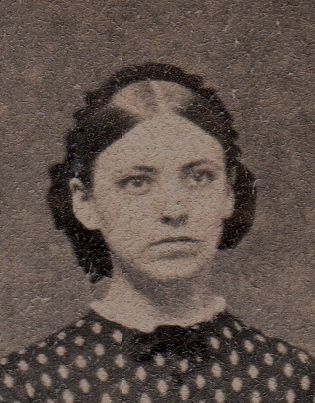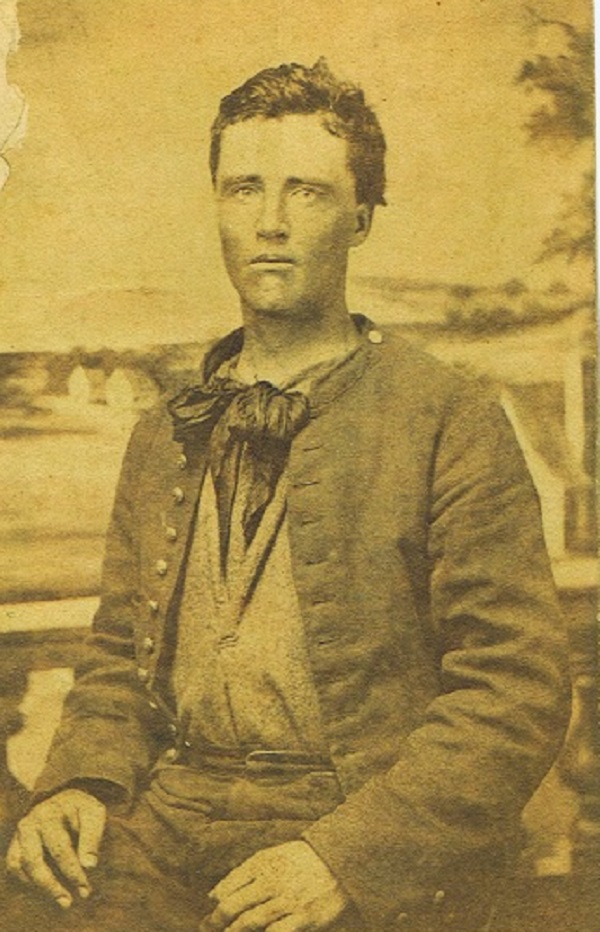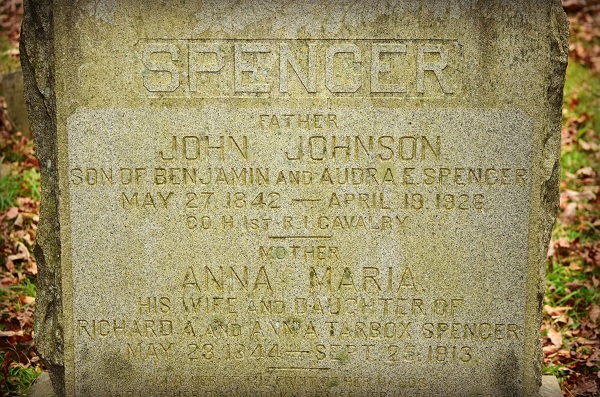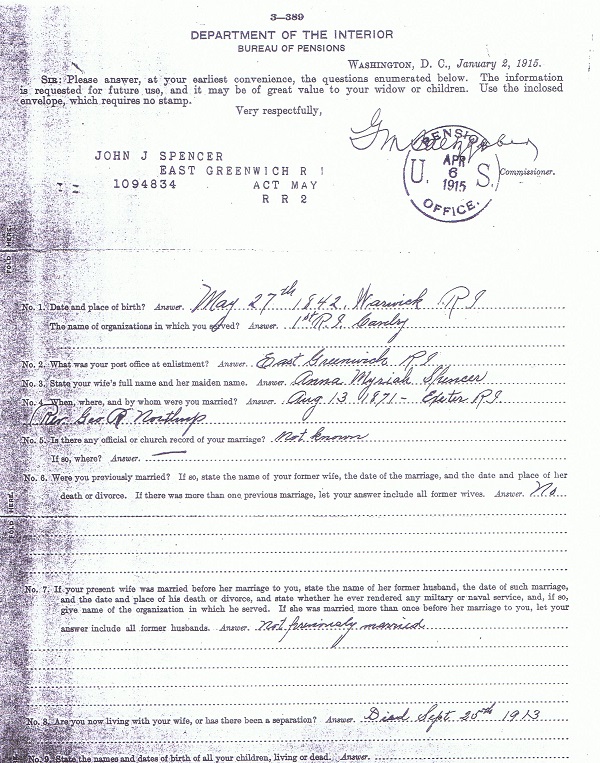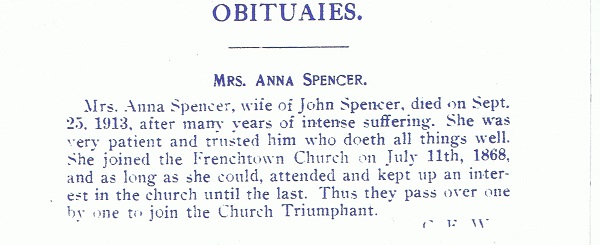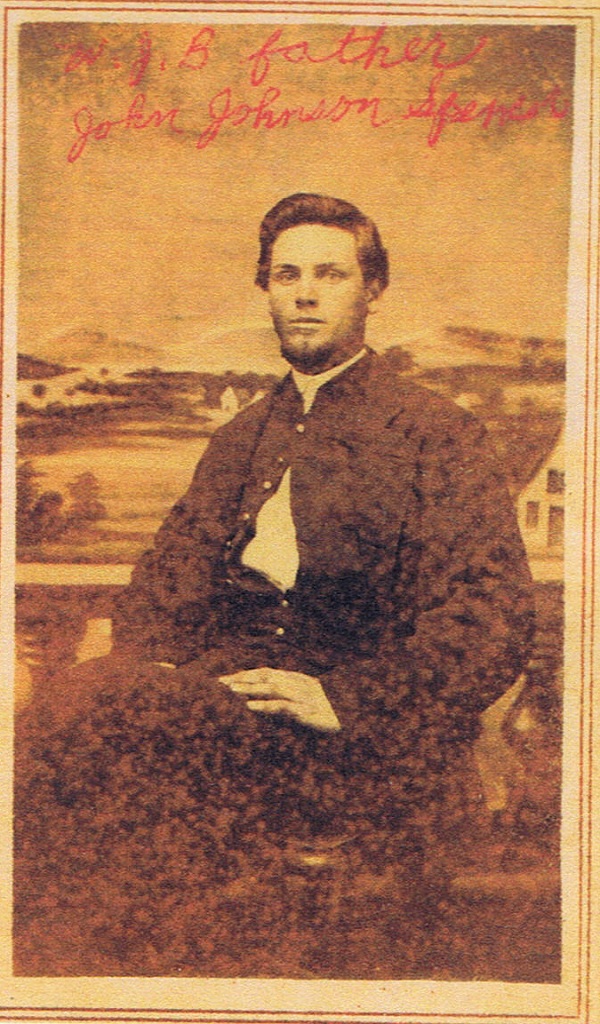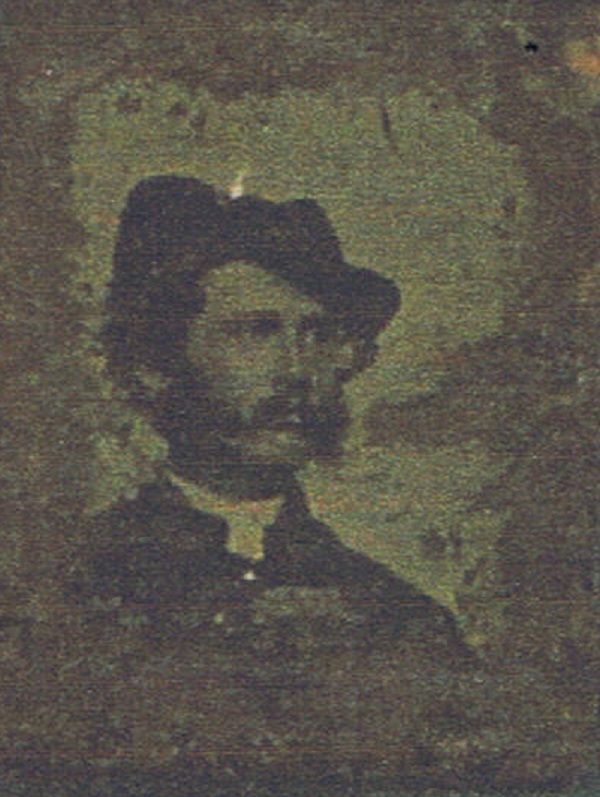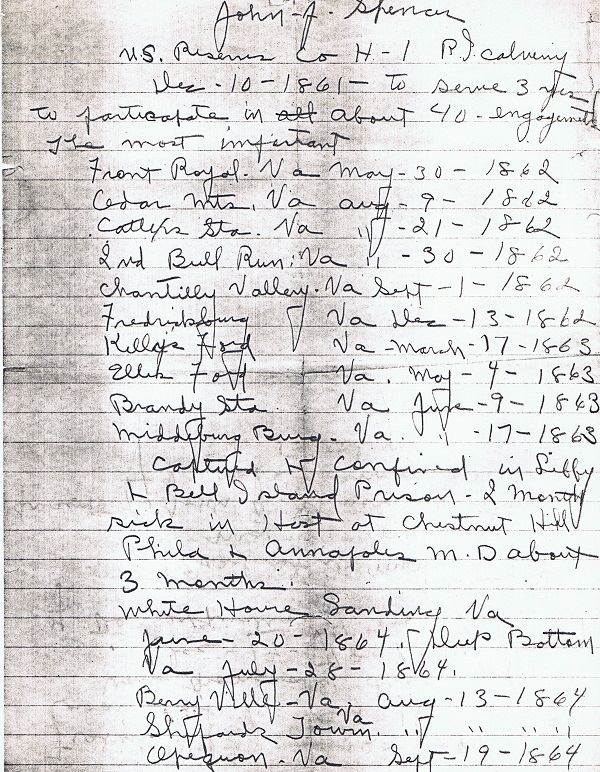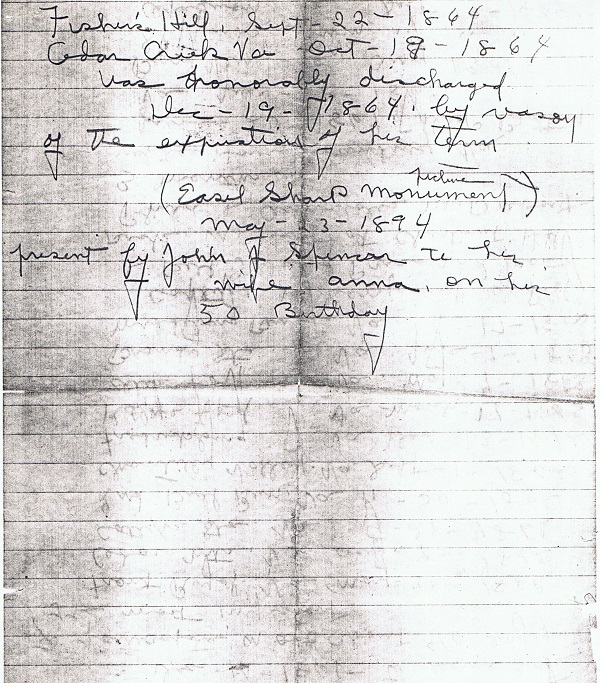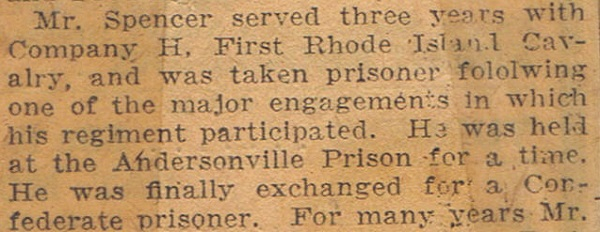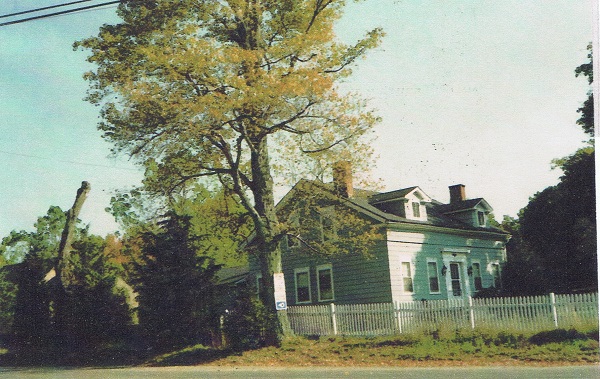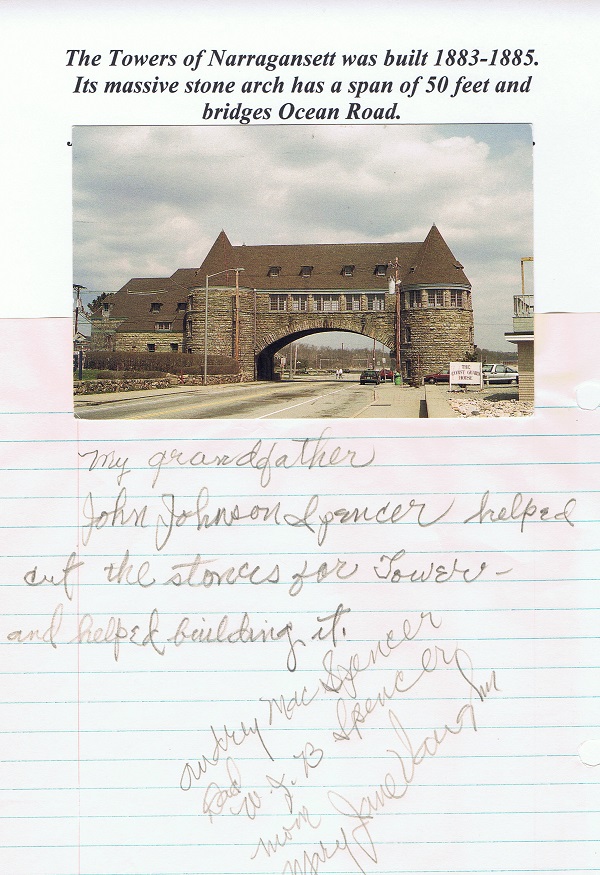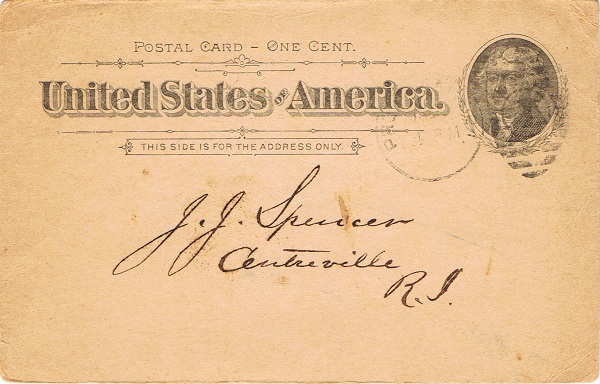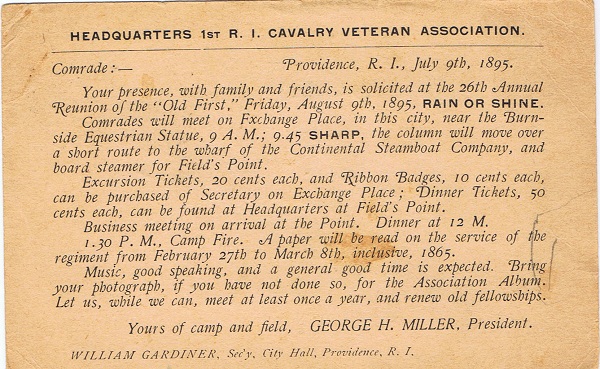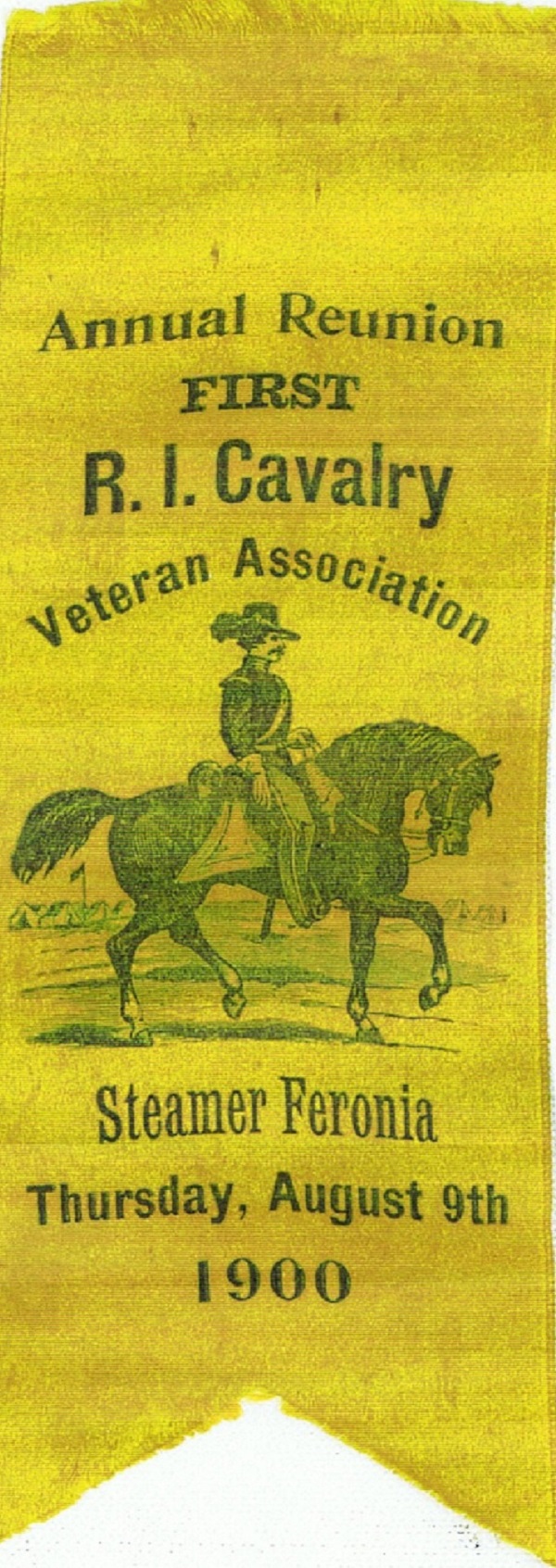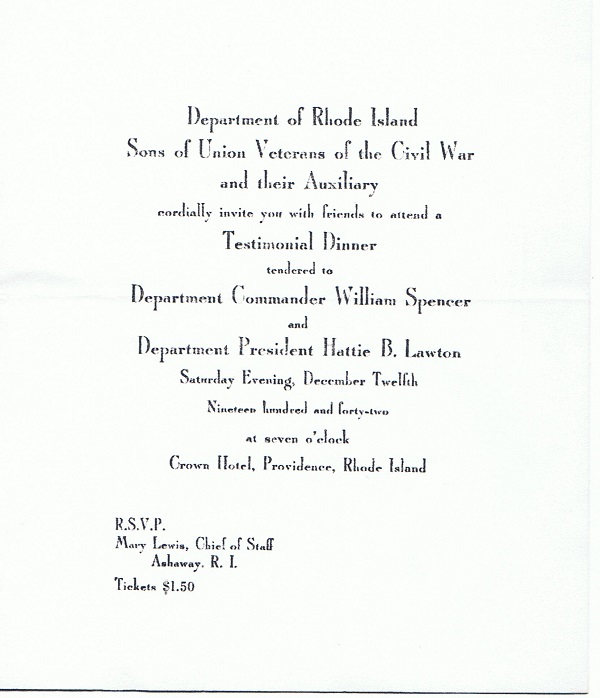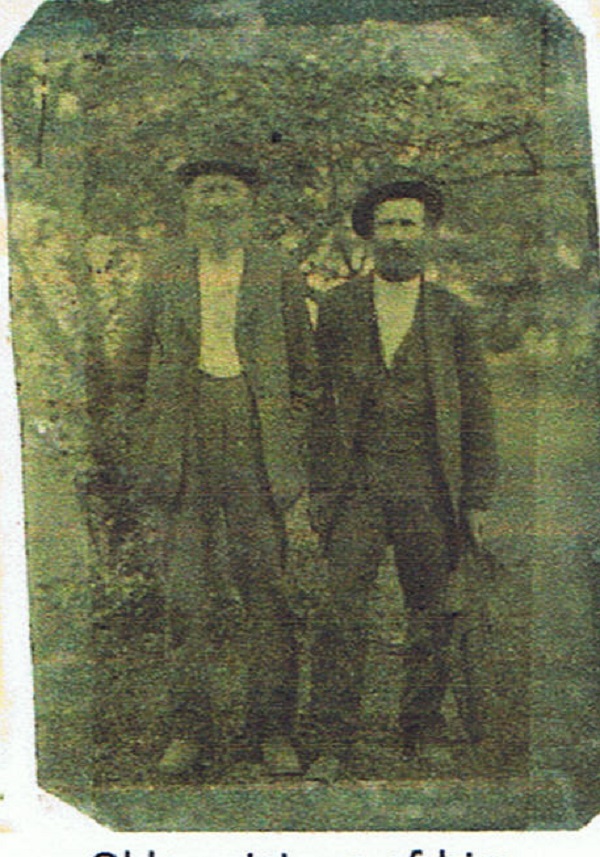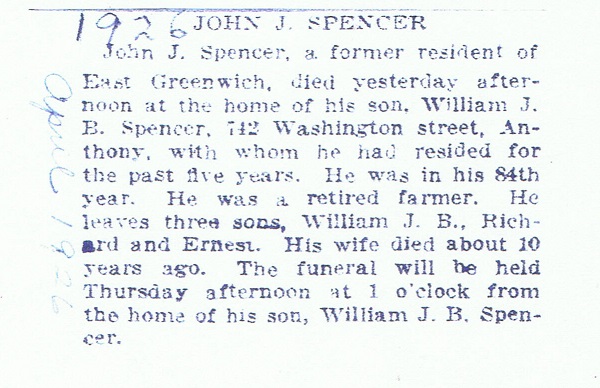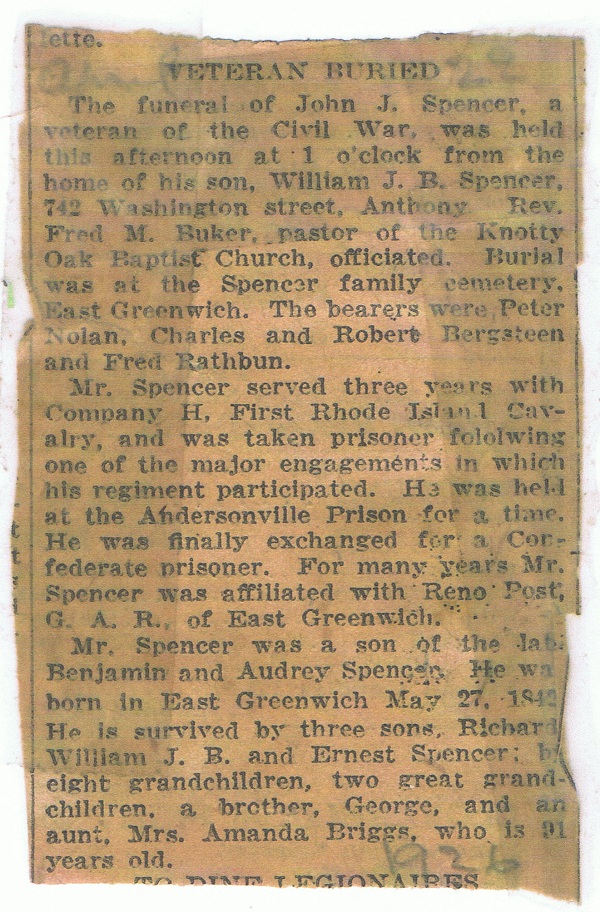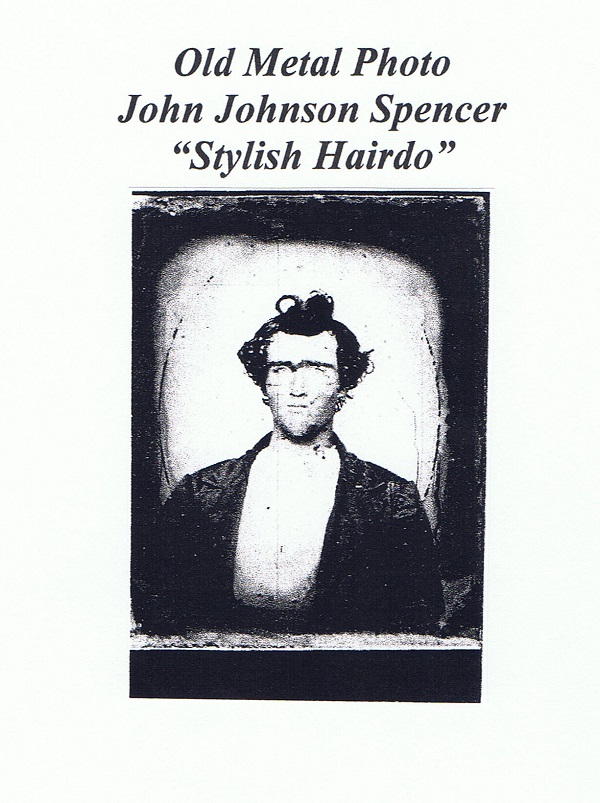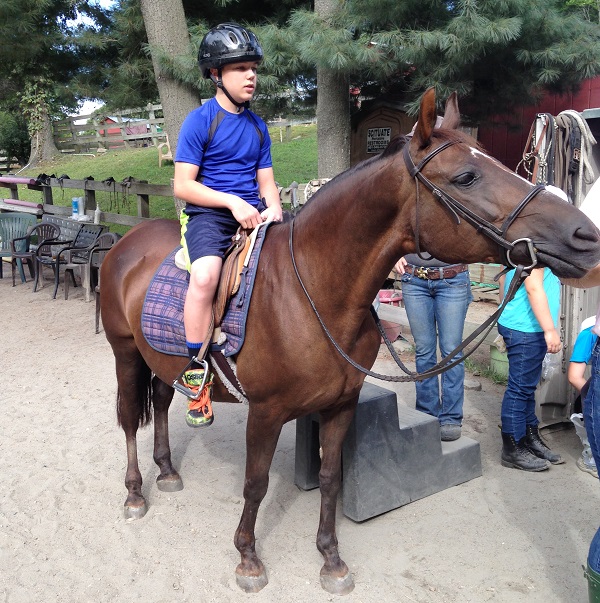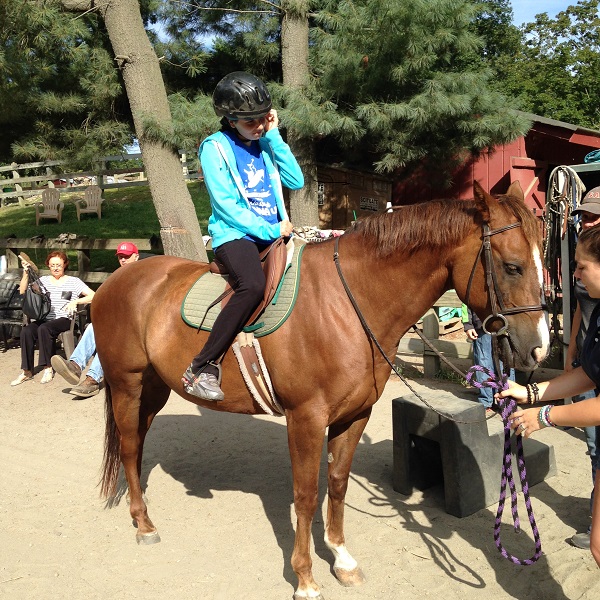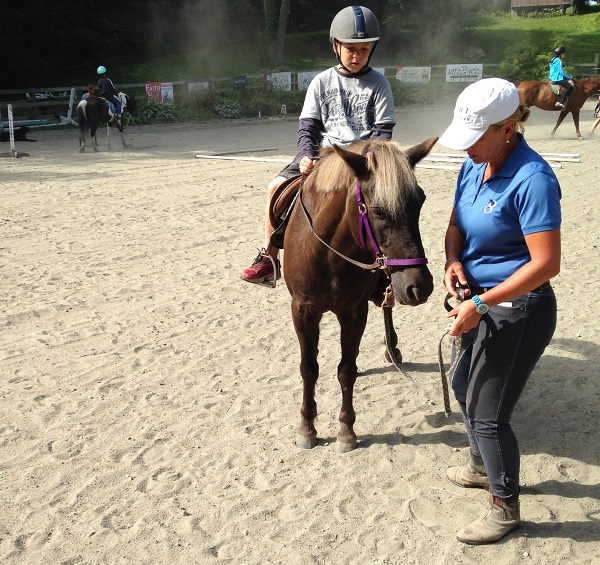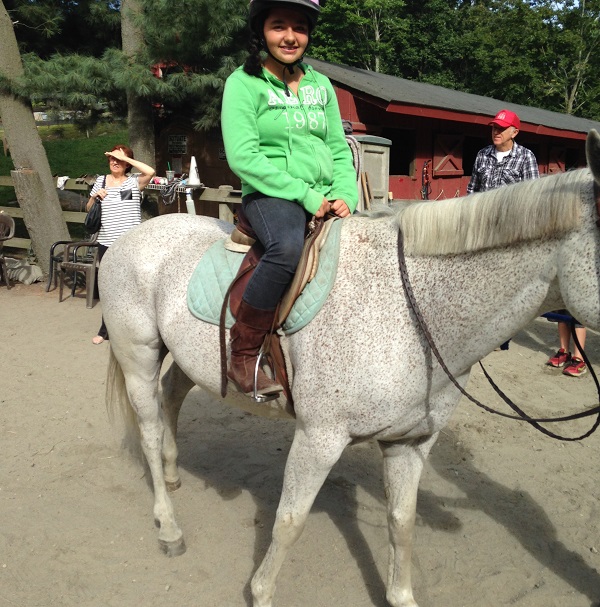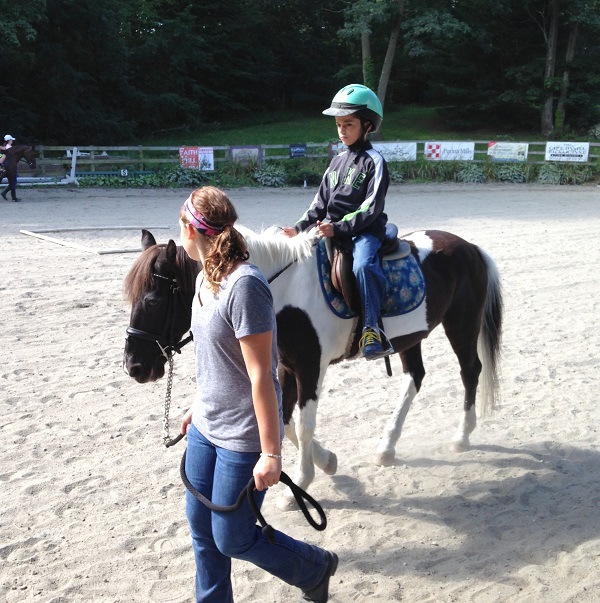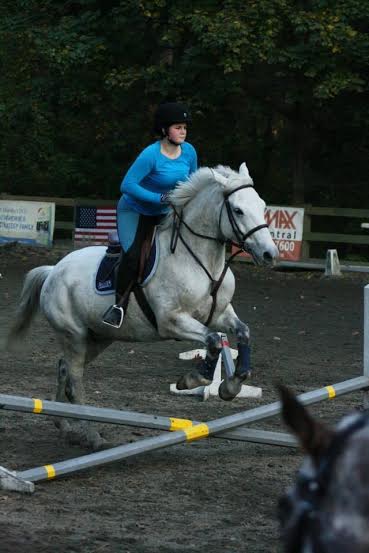Anna Maria (pronounced Anna Mar-eye-ah, b.5-23-1844–d.9-25-1913) and John Johnson (b.5-27-1842–d.4-19-1925) Spencer
Anna Maria (pronounced Anna Mar-eye-ah), an eighth generation Spencer in East Greenwich, Rhode Island, was the daughter of Richard Anthony and Ann Almy (née Tarbox) Spencer. Anna Maria and John Johnson Spencer were married on August 13, 1871 by Reverend George Northrop in Exeter, Rhode Island. To distinguish this John Spencer from the other John Spencers, Audrey Mae always referred to him as John Johnson, using both his first and middle name. His middle name, Johnson, was his great-grandmother’s, Huldah’s, family name. However, Esther Amanda (née Spencer) Briggs wrote on page 29 in her notebook that his nickname was John “Ace”. Web site author does not believe that Audrey Mae knew that John Johnson was called John “Ace” as Audrey Mae never spoke of her grandfather’s nickname. Anna Maria (Mar-eye-ah) and John Johnson had three sons, Richard Augustus (“Rich”), William J.B. (“Will”) and Alfred Ernest (“Ern”) Spencer. John and Anna Maria raised their sons at the Spencer house on Spencer’s Corner (Division, Crompton and Shippeetown Road intersection of East Greenwich, R.I.) Their middle son, William J.B. Spencer was the father of Audrey Mae, Edith Anna and John Edward (“Ed”).
No. 8 Anna Maria (“Mirah”) Spencer
According to Audrey Mae’s artistic map diagram and gravestone numbering system, Anna Mirah (Maria, pronounced Anna Mar-eye-ah) and John Johnson Spencer share the same large Gravestone Number Eight in the Spencer family cemetery on Middle Road. Anna Maria (Mar-eye-ah) and John Johnson Spencer are Audrey Mae’s, John Edward’s and Edith Anna’s grandparents.
Anna Maria (Mar-eye-ah) Spencer and John Johnson Spencer are both eighth generation Spencers in East Greenwich, R.I.
Using her Smith-Corona typewriter in the 1980s, Audrey Mae typed the following mini-biography of Anna Maria (Mar-eye-ah):

Anna Maria (Mar-eye-ah) was the child of Richard Anthony Spencer, the first son of Roby and Richard Anthony (“Deacon”) Spencer. The child had just turned one year old when her father died. She was raised in East Greenwich with the extended Spencer family comprising mainly her paternal grandparents, Roby and Richard Anthony (“Deacon”), and her father’s sister, Audra Eleanor. Anna Maria and her father’s younger sister, Esther Amanda (“Aunt Mandy”) grew up like sisters as they were only eight years apart.
Although both Anna Maria’s parents’ birthplace was East Greenwich, Rhode Island, Anna Maria’s (Mar-eye-ah)’s birthplace was Versailles, Connecticut. Historical records have Anna Maria’s father, Richard Anthony, marrying, living and dying in New York City, but Audrey Mae never heard or read anything about her grandfather’s travel to New York or his death at such a young age while in New York. Whereas Richard Anthony and his daughter, Anna Maria (Mar-eye-ah) are buried in the Spencer family cemetery (aka E.G.No.9) on Middle Road, Richard Anthony’s wife, and Anna Maria’s mother, Ann Almy (née Tarbox) is not buried in the Spencer family cemetery.
Audrey Mae, the carrier of the Spencer oral tradition, always pronounced her grandmother Anna Maria’s name as Anna Mar-eye-ah. Audrey Mae spelled Anna Maria’s middle name “Mirah” because that is how Rhode Islanders with their accent heard the name. John Johnson Spencer’s pension papers have the spelling of Anna Maria as Anna Myriah. (An outside explanation of the Maria spelling and pronunciation as Mar-eye-ah can be found in the book, Play It As It Lays by Joan Didion. Maria was pronounced Mar-eye-ah in England at that time in history.) The author of this website had promised Audrey Mae that whenever she keyed in the name Anna Maria, she would always explain to pronounce Maria as Mar-eye-ah. Audrey Mae having heard her grandmother’s name many, many times was really concerned that the descendants know the correct pronunciation of her grandmother’s name. “I always heard the name pronounced Mar-eye-ah” said Audrey Mae in her late eighties, “I never heard it pronounced differently”. “The spelling on the gravestones was not always correct. This must be wrong.” “Are you sure the spelling on the stone is correct?…” continued Audrey Mae. The author of this website has cheerfully kept her promise to always key in the pronunciation of Maria as Mar-eye-ah. ![]()
Audrey Mae (née Spencer) MacDonald wrote mini-biographies of all the people buried in the Spencer family cemetery. Audrey Mae’s mini-biography of Anna Maria and John Johnson Spencer had a connecting line and letter “M” (for marriage) attached to show that both husband and wife are buried in the Spencer family historical cemetery. The written number 8 means John and Anna are eighth generation Spencers in East Greenwich, Rhode Island. The typed number 8 means their gravestone is assigned number 8 in Audrey Mae’s gravestone numbering system. Anna Maria (Mar-eye-ah) died thirteen years before her husband John Johnson.

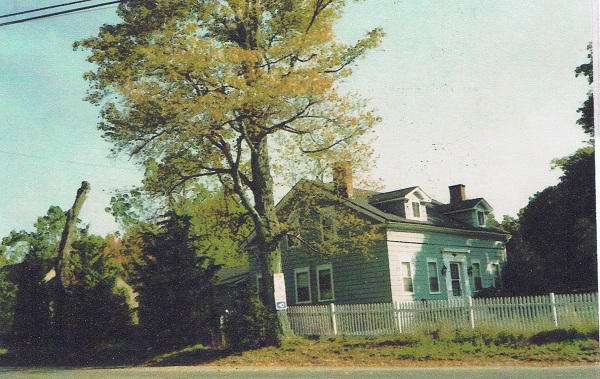
John Johnson and Anna Maria (Mar-eye-ah) Spencer’s home at Spencer’s Corner in East Greenwich, Rhode Island.
Audrey Mae’s memoirs of 6-19-2002 give the following information about the Spencer property. “The house on Spencer’s Corner (the northeast corner of Division Street and Crompton Road in East Greenwich, Rhode Island) descended to Deacon Richard and then to his descendents. This house on Spencer’s Corner was where John Johnson and Anna Maria Spencer’s three sons – William J.B. Spencer, Alfred Ernest Spencer and Richard A. Spencer- were born. (audreymaespencer.com)
John and Anna Maria raised their sons at the Spencer house on Spencer’s Corner (Division, Crompton and Shippeetown Road intersection) with one exception. John and Anna Maria’s middle son, William J.B. Spencer, at age twelve, no longer lived with his parents and brothers in this Spencer house on Spencer’s Corner. He was sent to live with his great-uncle William Augustus (“Gus”) Spencer’s family on Middle Road in East Greenwich, Rhode Island. He would work the farm with his great-uncle and thereby inherit the farmland or homestead as the Spencer descendants called the land. His great uncle “Gus”, the sixth child of Richard Anthony (“Deacon”) and Roby (née Tarbox) Spencer, had no male heirs.
(Author’s note: Needless to say, there was no love lost between the older uncle and his young nephew and given the situation, one can understand why. There was fifty years difference in ages between older great-uncle and young nephew. Besides, inheriting land would not mean much to a twelve year old boy in 1890. To inherit the land, he had to leave his parents, brothers, his own family farm and home life as he had known it for the first twelve years of his life. I doubt William J.B., the middle son of John Johnson and Anna Maria (Mar-eye-ah), was given a choice.) William J. B.’s and Mary Jane (née Vaughn) Spencer’s children, Edith Anna, John Edward and Audrey Mae, would then be born and raised on this farmland until Audrey Mae was twelve and her father sold the farm and the family moved to Anthony, an upscale section of Coventry, Rhode Island in 1922.
Another interesting and somewhat amusing tale about the early life influences on William J.B. is how William J.B. got his middle name. Anna Maria’s biological mother Ann Almy’s second husband was Joseph Briggs. He paid his stepdaughter, Anna Maria (Anna Mar-eye-ah) $50.00 if she would name one of her sons after him. She named her second son, William Joseph Briggs Spencer. This great-grandson of Richard Anthony (“Deacon”) Spencer and grandson of Richard Anthony Spencer and son of John Johnson Spencer, has Joseph Briggs as his middle name. However, he is no blood relation to Joseph Briggs. During his lifetime, William, the father of John Edward, Edith Anna and Audrey Mae, always signed his name as William J.B. Spencer.
William J.B’s older brother is named Richard Augustus, after his grandfather and great grandfather (Richard Anthony) and perhaps after his great-uncle William Augustus who was called “Gus”. William J.B. is named after his great, great, great grandfather, William, who is buried in the “over back” cemetery. (see straightspencerhistoricalcemetery.org) Author does not know who William’s younger brother, Alfred Ernest, is named after. The names Alfred and Ernest are not in Audrey Mae’s Spencer family line.
Audrey Mae’s oldest daughter’s memoirs written 2013: “All I ever knew was that Grampa Spencer did inherit the large land which he sold later on. Gramma Spencer had to cook for all the hired hands and she was not well. So they moved to 742 Washington Street which was a lovely place to live. I always remember being there with Grampa and Gramma and Anna Jane and thinking they were all wonderful. All three brothers, Richard Augustus, William J.B. and Alfred Ernest, were very brotherly to each other. I remember going with Gramp and visiting with Uncle Rich and Uncle Earn. Later I would take Mother to visit with Uncle Rich’s daughter on Division Road. There was a sign across the street called Spencer’s Corner. I don’t remember seeing it later. Gramma Spencer took care of Anna Maria (pronounced Mar-eye-ah) and great-Grampa John. Great-Gramma, Ann Maria (Mar-eye-ah) was very ill and Gramma took care of her until she died.”
If Anna Maria (pronounce Mar-eye-ah) had not married a Spencer, the Spencer name would have ended in this line as a surname, because Anna Maria’s father, Richard Anthony, died at age twenty-seven and left no other heirs.
Oral tradition carried down by Audrey Mae’s oldest daughter concerning Anna Mareyeah, as she spells her great-grandmother’s name: “Now to get back to Anna Mareyeah. She was always considered very loving because she was Grampa’s mother. Both Aunt Edith Anna and Anna Jane were named after her. Now I know that Anna Mareyeah was so beloved and I know she had to stand in front of a hot stove to cook. But didn’t everyone! (Web site author’s oral tradition is Anna Mar-eye-ah would cook and can all of the fruit and vegetables that grew on uncle Rich’s farm. Anna Mar-eye-ah’s legs starting bothering her and family thought it was because of standing in front of the hot stove for so long a time. Anna Mar-eye-ah [aka Anna Maria] became known as little sick gramma.) I do remember about Grampa’s mother with bandage legs. So, I guess that would explain for Anna Maria being sick little Gramma. (Web site author’s oral tradition is that little sick gramma came to live with her second son, William J.B. and his wife, Mary Jane and Mary Jane would bandage Anna Maria’s legs daily.) Mother always talked about Anna Maria with such love.”
Following is a newspaper article of Audrey Mae’s paternal grandmother’s, Anna Maria’s (Anna Mar-eye-ah’s), death in 1913.
An amusing observation is the misspelling of obituaries. The “R” is left out! For those who are not New Englanders or who do not know the Rhode Island speech pattern, that is how the New Englanders spoke, particularly before the radio, television–never mind computer–age. They put in the “R” where it didn’t belong and took out the “R” where it did belong. Example was President Kennedy pronouncing Cuba as Cuber. The author of this website remembers being confused because her friend in elementary school was called Linder but spelled Linda. The website author’s name is Heather but pronounced Heathah. When the author was in college in the Philadelphia, Pennsylvania area, there were two Heathers in her dorm. One was from Philadelphia and the other was from Rhode Island. The students would amusingly call the Philadelphian “Heather” and call the Rhode Islander “Heathah”.
Audrey Mae comment in her memoirs on 1-10-2004 about her older sister, Edith Anna: “Aunt Edith was close to Anna Maria, (her grandmother). When Anna Maria died, Edith went daily to her grave for a long time. I remember Anna Maria’s casket. We used to have the casket in the home. I remember my mother standing near the casket.” (audreymaespencer.com) On 10-23-2002 Audrey commented “I was 1-1/2 years old when she died. I walked around the casket; I couldn’t see in but I walked around it.”
Today (2013) one of Edith Anna’s great granddaughters has the middle name of Anna. She is named after her great grandmother and her great, great, great grandmother. This thirteenth generation Spencer in America is Melissa Anna who was born and raised in California–3,000 miles from the colonial Rhode Island Spencer homesteads.
(Author’s note: The author did not mention in the last paragraph above about the “correct” pronunciation of Anna Maria. I hope the readers just heard Mar-eye-ah in their heads as they were reading on. If so, my mission was successful and Audrey Mae’s oral tradition pronunciation will live on.) ![]()
No. 8 John Johnson Spencer (aka John “Ace”)
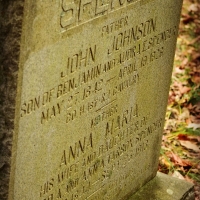 A Civil War stake and flag is by John Johnson’s and Anna Maria’s shared gravestone. John Johnson Spencer was a private in Lt. Greene’s Co.,1 Reg’t New England Cavalry, which later was known as Co.H,1 Reg’t R.I. Cavalry. Using her Smith-Corona typewriter in the 1980s, Audrey Mae typed the following mini-biography of John Johnson Spencer, an eighth-generation Spencer in East Greenwich, Rhode Island.
A Civil War stake and flag is by John Johnson’s and Anna Maria’s shared gravestone. John Johnson Spencer was a private in Lt. Greene’s Co.,1 Reg’t New England Cavalry, which later was known as Co.H,1 Reg’t R.I. Cavalry. Using her Smith-Corona typewriter in the 1980s, Audrey Mae typed the following mini-biography of John Johnson Spencer, an eighth-generation Spencer in East Greenwich, Rhode Island.

John Johnson was the son of Audra Eleanor (gravestone No. 53) and Benjamin (gravestone No.54) Spencer. John Johnson Spencer has two brothers, William Anthony (gravestone No. 23), Richard Benjamin (gravestone No.52) and two sisters, Evelyn Augusta (gravestone No. 57) and Roby Alice (gravestone No. 48) who are also buried in the Spencer family cemetery. (see Audrey Mae’s artistically designed cemetery map and gravestone numbering system at SpencerHistoricalCemetery.org.)
According to his obituary, John Johnson is survived by a brother, George, but web site author does not have any information about this brother.
- John Johnson Spencer, Lt. Greene Co.,1 Reg’t New England Cavalry-American Civil War
On December 10th, 1861, John Johnson Spencer enlisted in Lt. Greene’s Co., 1 Reg’t New England Cavalry. This Company’s name was later changed to Company H of the 1st Rhode Island Cavalry. He brought his own horse with him when he went into the Civil War. He obviously was an excellent horseman growing up on one of the Spencer farms as his rank as Private in the Civil War included his classifications as Farrier, Teamster and Blacksmith. According to Harold Barker’s History of the R.I. Combat Units in the Civil War “The history of the first Regiment R.I. Cavalry in the Civil War lists 56 encounters with the enemy. Some of these encounters were major engagements while others were the results of skirmishes and raids. This is understandable as the mission of Cavalry included acting as a covering force for the main body, reconnaissance patrols and raids. The bulk of the Regiment’s service was the Cavalry force in the Army of the Potomac. In reading the history of this unit one is impressed with the rather large number of prisoners taken by the enemy. This was the result in part by the number of patrols on picket duty and skirmishes made by small detachments.”
The Nat’l Archives and Records Administration have John Johnson’s rank as Private & Blacksmith. “In the line of duty at Manassas, Virginia on or about 7-15-62 he was pulled from his horse & injured: Injured across the small of his back”. Also “About the month of Sept 1863 at Annapolis, he contracted Typhoid fever & since which time, he has been troubled with severe pains in back & abdomen”.
John Johnson Spencer’s military service record at the National Archives:
- National Archives and Records Administration, Washington, DC 20408
The Civil War Library and Museum (America’s Oldest Chartered Civil War Institution) in Philadelphia, Pennsylvania has the following information on John Johnson Spencer: “John Johnson Spencer, Residence: West Greenwich, Rhode Island, 1st Regiment Rhode Island Cavalry, Private, Company H, December 11,1861 Enrolled, July 1962 Absent sick at Washington, D.C., June 18, 1863 Taken prisoner near Middleburg, Virginia, Subsequently paroled. Exchanged, October 1863, Absent sick in General Hospital, and bourne as absent sick until January 1864, May 28, 1864, detached for service at Gen Abercrombie’s Headquarters, August 1864, absent sick and so bourne until Dec, 1864, Dec 19, 1864 mustered out”. A energetic researcher at the Library, who was helping the web author’s husband find information, showed him the huge binder which included information on John Johnson Spencer. These binders were so old and fragile that no copies could be made from the pages, but Chuck, the author’s husband, could hand copy the above information from the very old papers in one of the many binders. The researcher said John Johnson was “mustered out 12-19-1864 because he was sick. That was 3-4 months before the war ended.” The author doesn’t find that written elsewhere about mustering out because of sickness, but John Johnson Spencer was sick the rest of his life from his war experiences so that is no surprise that the researcher said that.
The above paragraph has John Johnson from West Greenwich, but that is because the town boundaries changed back and forth. This Spencer line is definitely from East Greenwich area of Rhode Island.
Audrey Mae knew that her grandfather, John Johnson Spencer, was captured and sent to Libby prison in Richmond, Virginia where he had to eat uncooked pork. This caused him to have stomach problems for the rest of his life. Allan Nevins’ book War for the Union mentions “the Union captives in filthy Libby prison”. One of Audrey Mae’s grand nieces, Luane (née Cahoon) remembers hearing from her mother and a grandparent that her great grandfather, John Johnson Spencer, was also at Belle Isle Prison. According to Luane’s research on the internet “Belle Isle was a holding place for all the prisoners that went in or out of Libby Prison.“ Luane was told that her great grandfather “enlisted to serve three years. He participated in many engagements. The most important were Front Royal, Virginia (May 30, 1862), Cedar Mountain, Rappahammock Station, Virginia (August 23), Chantilly, Virginia (Sept 1862), WhiteHouse Landing (June 20) and ____Creek (October 19).” Luane had been told that her great grandfather had been captured and was “confined in Libby Prison for some months.”
Another source was Edith Anna (née Spencer), John Johnson Spencer’s granddaughter, who wrote that her grandfather was at Belle Isle Prison in addition to Libby Prison. Belle Isle prison was in the Richmond area of Virginia.
Descendants know that John Johnson Spencer was captured near Middlebury, Virginia and became a Yankee prisoner of war in June of 1863. Descendants also know that he was held at Belle Isle and Libby Prisons in Richmond, Virginia.
His obituary stated he was at Andersonville Prison in Andersonville, Georgia but his descendants doubt this. Fortunately, John Johnson Spencer was paroled by Abraham Lincoln’s prisoner exchange program before the program abruptly ended. John Johnson was exchanged for a Confederate prisoner. The South would not exchange the Black union soldiers, so President Abraham Lincoln gave the South an ultimatum: either have the Black union soldiers in the exchange program or the program will be stopped. The parole program ended.
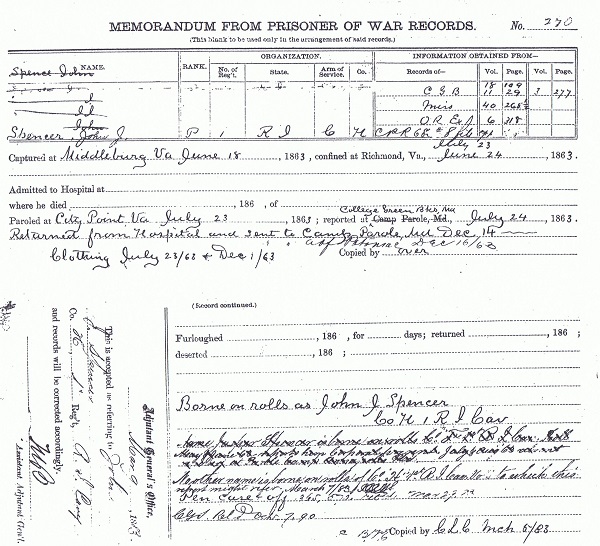
National Archives & Records Administration, Washington, DC Captured at Middleburg, Confined at Richmond, Paroled at City Point, Reported at College Green
According to his detachment Muster-out Roll, John Johnson was honorably discharged December 19th, 1864. Even with his injuries, sickness and capture he still completed his three years in the war and was able to go home. With over 500,000 men dying in the Civil War, he was very fortunate to have stayed alive even if that meant being ill for the rest of his life. Irregardless, he still labored long and hard on the farm all the rest of his life as a typical Yankee would do. He lived to age 82 years! Yankees would not complain or give in to sickness or ill health but would labor on through the pain. Yankee stoicism is very prevalent even to this day.
Numerous Spencer descendants were told the oral tradition of John Johnson Spencer: He was a Private, Blacksmith, Teamster and Farrier in Company H, 1st Regiment Rhode Island Cavalry during the Civil War. He was taken prisoner near Middlebury, Virginia but was eventually exchanged in the prisoner exchange program between the north and the south. Descendants take great pride in his service.
Nearly seven years after his discharge from the military, John Johnson Spencer married Anna Maria (pronounce Mar-eye-ah).
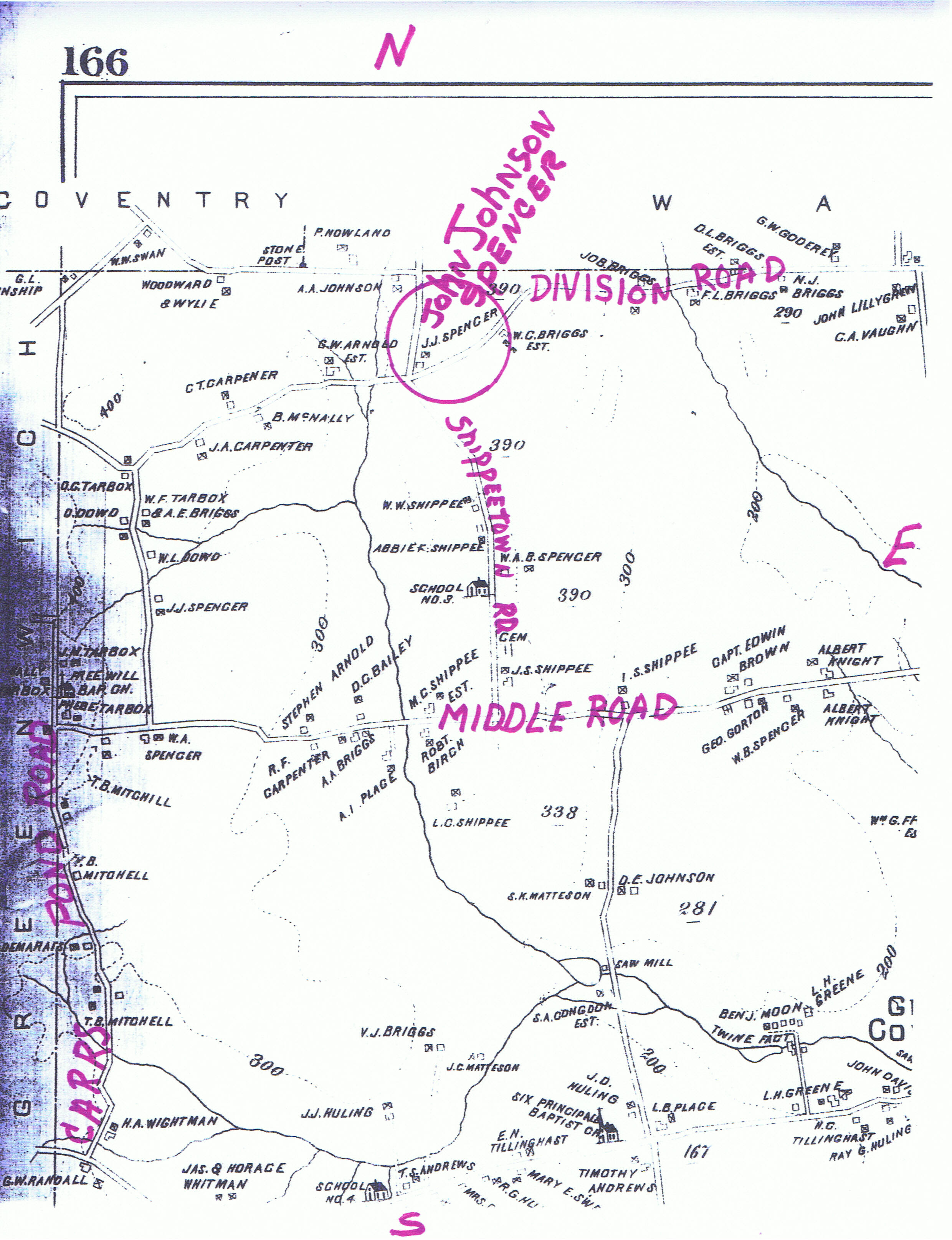
Map of Anna Maria (Mar-eye-ah) and John Johnson Spencer’s land, Division Rd at Spencer’s Corner (Heritage Room in East Greenwich Free Library
Oral tradition carried through Audrey Mae gives us the story of John Johnson’s work back on the farm after the Civil War. Audrey Mae heard tell of how very proud the family was of John Johnson cutting the stones for the Towers at Narragansett. With his horses and wagon he would transport the stones to the construction area where he also helped build the Tower. Oral tradition has it that the stones that he cut were superior and the speed that he could get these stones to the construction area was also exceptional. Audrey Mae’s quote “He quarried with a star drill granite from Carr’s Pond and hauled granite by team to Narragansett. He was very proud of his team and would pass others going up hills.”
John Johnson Spencer was involved with the Rhode Island Cavalry Veteran Association. The following post card was mailed in 1895 with a one-cent postage. The post card was found in the possessions of John Johnson’s granddaughter, Edith Anna, after her death in December 8, 1991.
John Johnson Spencer’s great-grandson, Spencer, has the following ribbon framed in his Rhode Island house.
John Johnson Spencer’s middle son, William J.B. Spencer, was active in the Sons of Veterans Association for many years.
Audrey Mae (née Spencer) Mac Donald was twelve years old when her grandfather died at age eighty-two. She always remembered him as a quiet grandfather who seldom spoke. He lived with her parents until he died, which was the custom at that time in history, when children cared for elderly parents.
When John Johnson Spencer tried to get his government pension as an older man, he was at first denied because of a government mix up about his exact age. The fact that the National Archives & Records Administration have him mustering-in at age twenty (20) and mustering-out three years later at age twenty (20) could have something to do with this mix-up. (Author’s Note: Perhaps this led to his solemn demeanor. He was sick for the rest of his life from his fighting, his being a prisoner of war and his “living” conditions in the Civil War, and then for the government to initially refuse his well-earned pension was a bit much, to say the least.) Then to add insult to injury, the government kept sending his checks after he died. In his pension records are letters from his eldest son and then from his middle son’s wife who was sending back the checks to the government.
News clipping of John Johnson Spencer’s obituary (Name of newpaper and exact date is not known):
The following newspaper obituary records John Johnson Spencer being held at the Andersonville Prison in Georgia, but the descendants doubt this.
Perhaps the only prison that was well-known in Rhode Island was the horrific Andersonville Prison in Georgia, so when the newspaper reporter knew that John Johnson Spencer had been in a confederate prison, he just surmised that it was Andersonville Prison in Georgia. In 2002, one of Audrey Mae’s daughters, skeptical about the Andersonville prison in John Johnson Spencer’s obituary, called Andersonville Prison Museum in Georgia. They have no record of her great-grandfather, John Johnson Spencer, being a prisoner there, but requested hearing from her if she was able to find any evidence that he was there. Descendants have found no information, outside of the newspaper obituary, that he was ever there. Descendants know that he was a prison-of-war and held at Belle Isle Prison and Libby Prison in Virginia.
Records of the Civil War period show five John Spencers from East Greenwich, Rhode Island went to fight for the Union. Two died in the Civil War and three returned home with one, Audrey Mae’s, John Edward’s (“Ed’s”), and Edith Anna’s grandfather, having been a prisoner of war. Without a doubt, all five were descendants of John and Susannah Spencer, Founders and Early Settlers of East Greenwich. John’s and Susannah’s eight sons all lived to adulthood, married, had children and stayed in the East Greenwich area of Rhode Island.
“Spencer descendants, if you have any additional information on Anna Maria (pronounce Anna Mar-eye-ah) and John Johnson Spencer, please add a comment to this web site and the web site editor will add this to the site. Thanks!”
UPDATE: Keeping the tradition alive in the 21st century, five of John Johnson (“Ace”) Spencer’s great, great, great-grandchildren are learning to ride horses. (In addition to fighting in the Civil War, the children’s ancestor was also classified as farrier, teamster and blacksmith.) The children’s riding lessons at FaithHill Farm in East Greenwich, Rhode Island are a short distance from the Spencer homesteads
John Johnson (“Ace”) Spencer’s great, great, great-granddaughter, Jessica, a university student, following in the Spencer tradition, is also an excellent rider.

